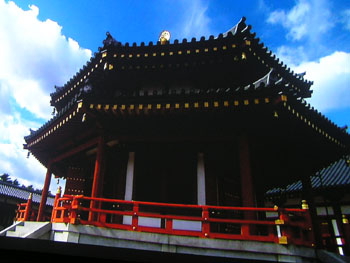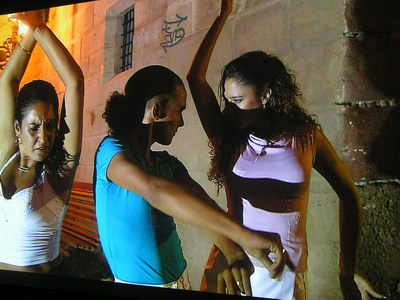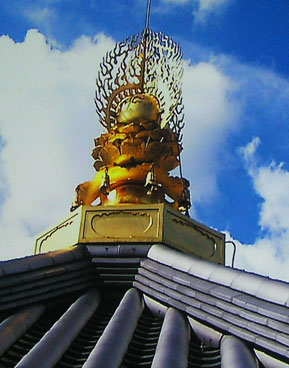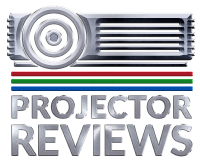This is going to be very repetitive, primarily by virtue of the fact that this is the best performing projector I have yet seen.
The Basics:
I started with several D-VHS tapes producing 1080i, you will see some of the images below. Everything was razor sharp. Compared to my BenQ 8700+ (which sells for about 1/5th as much), the difference was immediately noticeable, but not overwhelming. The first thing I did, was go back and forth between the two looking at color accuracy, black levels, richness of color, etc., while there were differences, individually none were striking. While I found small differences doing this, the big question was: OK, what makes this worth the huge difference in price.
Then it was time to get serious, and I started watching 5 -15 minute segments, first on the BenQ. When I switched to the JVC, I started to become aware that this was a different level of performance. True, there is extra sharpness on the HDTV tape, (which is 1080 resolution, more than the BenQ’s native 720 resolution, but that was just one element.
It became apparent that the JVC offered richer, and more accurate colors noticeable on things like flesh tones, grass, and, well, just about everything. I worked my way through 3 different Hi-Def tapes, and by the end of the first session, everytime I switched back to the BenQ after viewing a segment on the JVC, I found myself more and more aware of the difference. By the time I quit for the evening, all I could think about was how to talk JVC into donating one of these magnificent projectors to my personal home theater.
Of course, not everything out there is Hi-Def, so the second night, I broke out the usual DVD’s, and started up again.
Lord of the Rings was first. Of course, the DVD (at least this generation) are only 480 resolution, negating the 2K advantage of the JVC projector. I started again with the BenQ 8700+ and, of course it sure looked good. Switching over to the JVC, I immediately recognized some of the differences I observed the night before. Richer colors, and definitely a movie theater type quality – perhaps better (given the “low resolution”). When I finally switched back to the BenQ, again I was amazed at how it came up so short, compared to the JVC. Immediately below you can see an exteme closeup of an oriental bell. You are looking at a tiny part of the whole image, and if you look very closely, you can barely make out the pixel structure.
his trend of being subtly aware of a next level of performance continued with every one of my favorite DVD’s. (And I never even had to calibrate the JVC!)
So the bottom line question here is: Is the JVC worth the big bucks? If you have the bucks, the answer is definitely YES! (If, of course, it will fit in your room design.)
I know there is other competition out there from the likes of Runco, InFocus (their new 777) and others at the $30K price point, however none, to my knowledge can match the 2K resolution of the JVC. In terms of non visual issues, as well as brightness, overall ergonomics, and feature sets, the JVC may not be at the head of the class, but I projected the JVC to about 125” diagonal (as large as I could project on my 140” screen without rearranging all my furniture), and found that it’s claimed 500 lumens was more than up to the task. In fact when testing against the BenQ (rated 1000 lumens) my camera's meter readings were almost identical, in fact some times I would get need almost 1/3 of a stop less aperture with the JVC, indicating that it might actually be a touch brighter than my calibrated BenQ!
It matters not. If the JVC will fit your room, you WILL be satisfied. No, you will be enthralled.
Picking a screen: My own screen is a Dalite matte white, which I will be replacing in the near future. (It’s just a touch large for my new home’s home theater.) I found the matte to work very well with the JVC. I would definitely not recommend a gray surface, such as the Stewart Greyhawk, but suggest instead that best performance might be from a Firehawk, with its enhanced contrast and slight positive gain. In speaking with the folks at JVC, they suggested that on large surfaces something like the Stewart Studiotek with it’s 1.3 gain might be ideal, and that – room and lighting allowing, Stewarts 1.8 gain surface would also work well.
JVC DLA-HD2K - General Performance
Let’s start with the remote control. This is easy. First, the confusion. You get two remotes, one for the Processor, and one for the Projector itself. After initial setup, you will be almost exclusively dealing with the “projector’s remote.”
It has lots of buttons, but let’s cut to the chase. If you are doing a room with a $30K projector the odds are that you will be using some sort of universal remote system, probably a full blown Crestron system that will control everything from projector to sound to your screen (if motorized) motorized shades, lighting and of course the kitchen sink. If you don’t go with a system like the Crestron, you are at least likely to use something like one of the higher end Marantz remotes. Taking that into consideration, I wouldn’t worry too much about the ergonomics of the provided remotes, although I found the projector’s remote to be sufficiently well laid out to be able to use it effectively while testing.
The Lens
Herein lies my biggest complaint with the JVC projector. All you get is your basic zoom lens, it only has a ratio of 1:1.3 which is typical, however the JVC is a bit longer telephoto than many others out there. You will need to have a not too square room if you want a large screen. (My BenQ is the other way, it sits closer to the screen than most. To give you an idea, with the JVC’s zoom at widest, it can’t project as large an image as the BenQ with it’s zoom in max telephoto, from the same distance.
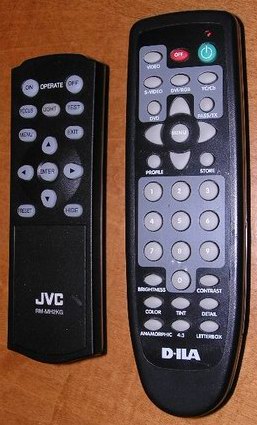 Click Image to Enlarge
Click Image to EnlargeOf course these are details your installation team will take care of. Either the JVC will fit, or it will not!
More to the point, here is a $30K projector that does not offer alternative lenses (except for the wide angle extension, which I haven't seen, but which the JVC product manager assures me is a first class piece of glass), means that the projector may not work for everyone's room. Keep your hopes up, though, that it will work in your theater.

